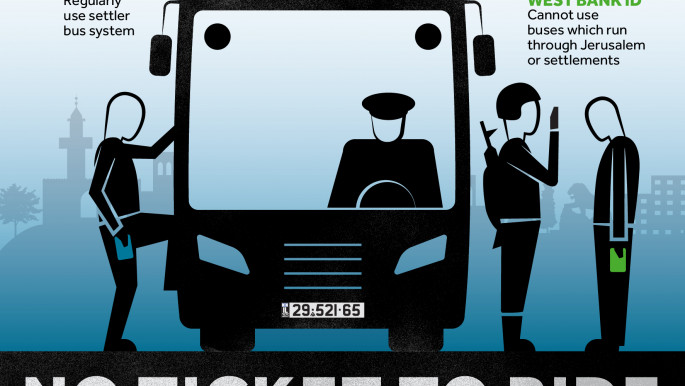International community 'blinded to reality': HRW Palestine, Israel director
Human Rights Watch's Israel and Palestine director, Omar Shakir, spoke with The New Arab’s Arabic-language sister site, Al-Araby Al-Jadeed, about the ground-breaking report which has been widely shared on social media.
"For years, many specialists and stakeholders have warned we could arrive at the reality of an apartheid regime," he told Al-Araby Al-Jadeed.
He said the international community "was blinded to the reality on the ground… apartheid and persecution" by the idea the occupation is "temporary" or that three decades of negotiations would "soon" lead to a resolution.
Read more: Landmark HRW report challenges Biden to end Israeli apartheid
Shakir acknowledged that Human Rights Watch was not the first to talk about Israel's system of racial segregation.
He said the NGO "takes extreme care" with proof concerning crimes against humanity.
While there has long been proof of Palestinians' persecution, he said, legal debates existed around evidence of "intent to control (per the legal meaning) by Israeli politicians".
Now, Shakir asserted, referencing, among other things, the growth in settlements and their infrastructural integration into Israel, this has been "unambiguously demonstrated".
As further evidence, he added that "Israeli politicians today talk about permanent rule over the West Bank".
"It might have been possible to say that this limit [of apartheid and persecution] had been surpassed years ago, but today we can say this without a doubt," he said.
 |
| Click here to enlarge image |
Asked about the challenges in producing the report, Shakir said his own November 2019 deportation "demonstrated once again a systematic practice on the part of the Israeli government against human rights defenders".
Shakir was deported under Israel's controversial "BDS law".
He added that Palestinian activists encounter even greater difficulties, for example, travel bans, and potentially even prosecution.
The Human Rights Watch report also called on the International Criminal Court to "investigate and prosecute those whose involvement in apartheid and crimes against humanity is proven".
HRW also believes in sanctioning Israeli officials found responsible and restricting arms sales to Israel in some circumstances if apartheid-like practices continue.
Despite this, the NGO does not support Boycott, Divestment and Sanctions (BDS).
Shakir explained that the campaign, which puts pressure on Israel economically, is not something the New York-based organisation has an official view on.
"We, as a human rights organisation, do not take official political positions on the occupation or on other matters," he said.
"But we document human rights persecutions committed by any party in the areas we work in."
Follow us on Facebook, Twitter and Instagram to stay connected
![Omar Shakir HRW [AFP/Getty] Omar Shakir HRW [AFP/Getty]](/sites/default/files/styles/large_16_9/public/media/images/74FEBAB4-09A1-4560-AA07-7AB277816892.jpg?h=d1cb525d&itok=6Ajfhu_C)

![President Pezeshkian has denounced Israel's attacks on Lebanon [Getty]](/sites/default/files/styles/image_684x385/public/2173482924.jpeg?h=a5f2f23a&itok=q3evVtko)



 Follow the Middle East's top stories in English at The New Arab on Google News
Follow the Middle East's top stories in English at The New Arab on Google News


